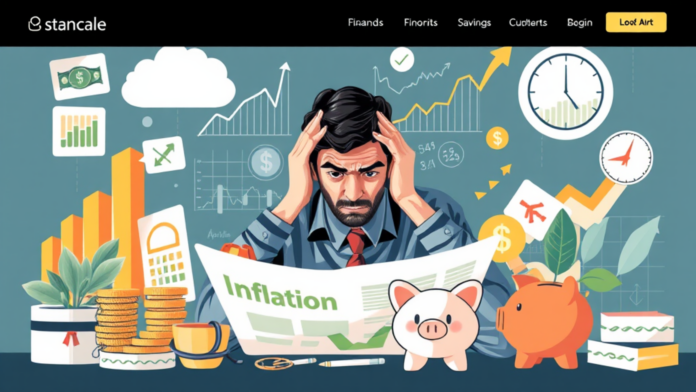Introduction to Inflation and Its Impact on Savings
Understanding Inflation: Definition and Causes
Inflation is the rate at which the general level of prices for goods and services rises, eroding purchasing power. This phenomenon can significantly impact savings, as the value of money diminishes over time. Understanding inflation is crucial for effective financial planning. It’s essential to stay informed. Factors contributing to inflation include demand-pull inflation, cost-push inflation, and built-in inflation. These elements can create uncertainty in the economy. Isn’t it fascinating how interconnected these factors are? As inflation rises, individuals may need to adjust their savings strategies to preserve their wealth. Protect your future.
The Current State of Inflation: Trends and Statistics
Currently, inflation rates have reached levels not seen in decades, significantly affecting economic stability. This trend raises concerns for individuals managing their savings. He must consider how inflation diminishes the real value of his assets. It’s a critical issue. Recent statistics indicate that consumer prices have surged, driven by supply chain disruptions and increased demand. These factors create a complex economic landscape. Understanding these dynamics is essential for informed decision-making. Knowledge is power.
The Importance of Safeguarding Your Savings
Why Traditional Savings Accounts May Fall Short
Traditional savings accounts often offer low interest rates that fail to keep pace with inflation. This situation can erode the purchasing power of his savings over time. He may find that his money loses value. Additionally, these accounts typically lack growth potential compared to other investment options. It’s a missed opportunity. As inflation rises, the real returns on savings accounts diminish significantly. Awareness is crucial.
The Long-Term Effects of Inflation on Purchasing Power
Inflation has a profound impact on purchasing power over time, leading to increased costs for essential goods and services. This gradual erosion can significantly affect his financial stability. As prices rise, he may find that his savings buy less than before. It’s a concerning trend. Long-term inflation can also influence investment decisions, as individuals seek assets that outpace rising costs. Staying informed is vital.
Investment Strategies to Combat Inflation
Exploring Inflation-Protected Securities (TIPS)
Inflation-Protected Securities, or TIPS, are government bonds designed to safeguard against inflation. They adjust the principal value based on the Consumer damage Index. This feature helps maintain purchasing power over time. Investors receive interest payments that also increase with inflation. Here are key benefits of TIPS:
These characteristics make TIPS an attractive option. He should consider diversifying his portfolio. It’s a smart move.
Diversifying Your Portfolio: Stocks vs. Bonds
Diversifying a portfolio with stocks and bonds can mitigate risk. Stocks typically offer higher returns but come with volatility. Bonds provide stability and fixed income. He should balance both for optimal growth. This strategy can enhance financial security. It’s essential to assess individual risk tolerance. Knowledge is key.
Real Estate as a Hedge Against Inflation
Understanding Real Estate Investment Trusts (REITs)
Real Estate Investment Trusts (REITs) allow individuals to invest in real estate without direct ownership. They typically generate income through rental properties and property sales. This structure provides liquidity and diversification. He can benefit from regular dividend payments. Key advantages of REITs include:
These factors make REITs an appealing investment. Understanding their mechanics is crucial. Knowledge empowers better investment decisions.
Buying Property: Pros and Cons in an Inflationary Environment
Buying property in an inflationary environment can offer significant advantages. Real estate often appreciates in value, providing a hedge against inflation. This appreciation can enhance his long-term wealth. However, he must also consider potential downsides, such as increased maintenance costs and market volatility. These factors can impact overall returns. Awareness is essential for informed decisions.
Alternativf Investments to Consider
Commodities: Gold, Silver, and Beyond
Commodities like gold and silver serve as effective hedges against inflation. These assets often retain value during economic uncertainty. He should consider diversifying his portfolio with them. Additionally , agricultural products and energy resources can provide further investment opportunities. These alternatives can enhance overall returns. Awareness of market trends is crucial. Knowledge is essential for smart investing.
Cryptocurrency: A Modern Approach to Inflation Hedge
Cryptocurrency has emerged as a potential hedge against inflation. Digital currencies like Bitcoin can provide an alternative store of value. He may find that they offer diversification benefits. Additionally, the decentralized nature of cryptocurrencies can protect against traditional market fluctuations. This aspect is particularly appealing. Understanding the volatility is essential for informed decisions. Knowledge is key in this evolving market.
Budgeting Techniques to Preserve Your Savings
Creating a Flexible Budget: Adapting to Economic Changes
Creating a flexible budget allows individuals to adapt to economic changes. This approach involves regularly reviewing income and expenses. He should prioritize essential expenditures while identifying discretionary spending. Adjusting allocations can enhance financial resilience. It’s a proactive strategy. Staying informed about market trends is crucial. Knowledge empowers better financial decisions.
Cutting Unnecessary Expenses: Where to Start
To cut unnecessary expenses, he should start by analyzing his spending habits. Identifying non-essential items can reveal significant savings opportunities. He may find subscriptions or memberships that are rarely used. Eliminating these can free up funds for essential needs. Tracking daily expenses is crucial for awareness. Knowledge leads to better financial choices.
Conclusion: Taking Action Against Inflation
Recap of Key Strategies for Protecting Savings
To protect savings, individuals should consider diversifying investments. This strategy can mitigate risks associated with inflation. Additionally, exploring inflation-protected securities can enhance financial security. He must stay informed about market trends. Knowledge is essential for effective decision-making. Taking proactive steps is crucial. Awareness leads to better outcomes.
Encouragement to Stay Informed and Proactive
Staying informed about economic changes is essential for effective financial direction. He should regularly review market trends and adjust strategies accordingly. Proactive measures can help mitigate the impact of inflation on savings. This approach fksters financial resilience. Awareness is key to success.

